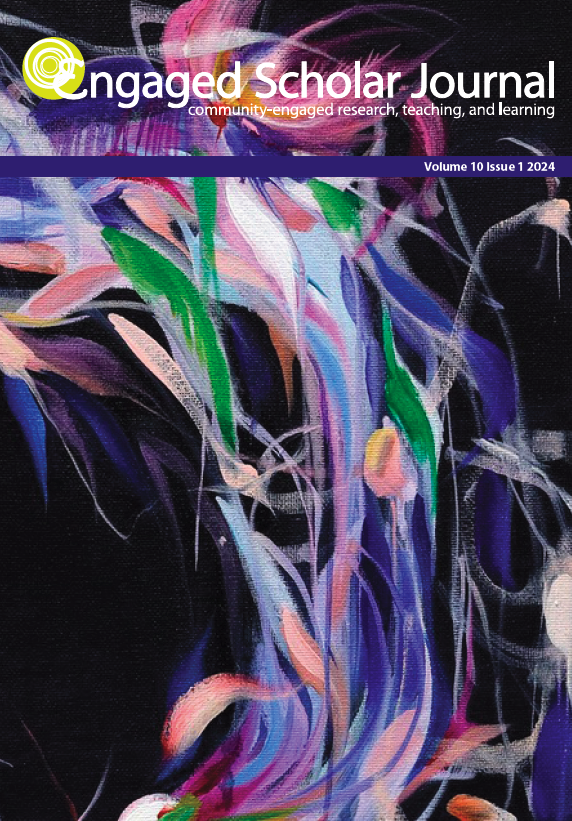Students as Engaged Partners in Directed Research Courses
DOI:
https://doi.org/10.15402/esj.v10i1.70862Keywords:
collaborative research, students as engaged partners, civic engagement, directed research coursesAbstract
This report from the field reflects on the authors’ experiences in a directed research course on the topic of youth civic engagement in Canada. A literature review was co-written as part of a directed research course where the instructor was a visiting professor from the United States and the student was an undergraduate student in Canada. The content of this report was gathered during various stages of the directed research course and is informed by literature focused on students as engaged partners in teaching and learning in higher education. Specifically, we reflect on the ways viewing students as engaged partners can leverage their knowledge and lived experiences when engaging in directed research courses, especially when the student and faculty member may be coming from different countries in North America. In addition, we reflect on how designing a directed research course that views students as engaged partners can provide a rich ground for the redistribution of power in higher education and strengthen the quality of research through the co-creation of new knowledge and ideas.
References
Centre on Governance, Faculty of Social Sciences (2023). Directed Research in Social Sciences Course Outline – FSS 4150. University of Ottawa. Fall 2023.
Haney, S., Dean, Y., Chronik, M., & Creig, A. (2021). Power, voice and positionality: An undergraduate student-faculty research team podcasts their experience with a students-as-partners framework. Imagining SoTL, 1, 116–121. https://doi.org/10.29173/isotl534
Healey, M., Flint, A., and Kathy Harrington, K. (2016). Students as partners: Reflections on a conceptual model. Teaching and Learning Inquiry, 4(2), 8-20. https://doi.org/10.20343/teachlearninqu.4.2.3.
Healey, M., Flint, A., & Harrington, K. (2014). Engagement through partnership: Students as partners in learning and teaching in higher education. Higher Education Academy.
Healey, M., & Jenkins, A. (2009). Developing undergraduate research and inquiry. Higher Education Academy. https://documents.advance-he.ac.uk/download/file/document/537?_ga=2.214030167.1195728257.1710191912-476125706.1710191912
Higher Education Academy. (2016). Essential frameworks for enhancing student success: Student engagement through partnership. Higher Education Academy.
Hvenegaard, G., Link, A. L., Moore, S. E., & Wesselius, J. C. (2013). Exploring the dynamics of directed studies courses: Student, instructor, and administrator perspectives. The Canadian Journal for the Scholarship of Teaching and Learning, 4(2). http://dx.doi.org/10.5206/cjsotlrcacea.2013.2.5
Kuh, G. D. (2008). High-impact educational practices: What they are, who has access to them, and why they matter. Association of American Colleges and Universities.
Lopatto, D. (2010). Undergraduate research as a high-impact student experience. Peer Review, 12(2), 27-30.
Moore, S. E., Hvenegaard, G. T., & Wesselius, J. C. (2018). The efficacy of directed studies courses as a form of undergraduate research experience: a comparison of instructor and student perspectives on course dynamics. Higher Education, 76(5), 771-788. https://doi.org/10.1007/s10734-018-0240-7
Reitmaier Koehler, A., Reveling Smith, L., Davies, S., & Mangan-Danckwart, D. (2015). Partners in research: Developing a model for undergraduate faculty-student collaboration. International Journal of Nursing Education Scholarship, 12(1), 131-142. https://doi.org/10.1515/ijnes-2015-0029
University of Ottawa. (2023). Directed research in social sciences course outline–FSS 4150 [Course handout]. University of Ottawa.
Downloads
Published
How to Cite
Issue
Section
License
Copyright (c) 2024 Jodi Benenson, Skylar Johnson

This work is licensed under a Creative Commons Attribution 4.0 International License.
Authors who publish with this journal agree to the following terms:
- Authors retain copyright and grant the journal right of first publication with the work simultaneously licensed under a Creative Commons Attribution License CC BY 4.0 that allows others to share the work with an acknowledgement of the work's authorship and initial publication in this journal.
- Authors are able to enter separate, additional contractual agreements for the non-exclusive distribution of the journal's published version of the work (e.g., post it to an institutional repository or publish it in a book), with an acknowledgement of its initial publication in this journal.
- Authors are permitted to post their work online (e.g., in an institutional repository or on their website) after the publication of their work in the Engaged Scholar Journal.
- Please note that while every opportunity will be taken to ensure author participation in the editing process, due to time constraints final copyediting changes may be made before publication to ensure APA adherence throughout all submissions.




